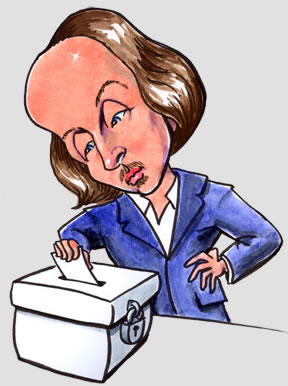Taxing Art
Targeting the Arts in Budget Cuts
Slices Out the Heart of Humankind
 It was my first stab at political activism.
It was my first stab at political activism.
And it came as I was building this website. Which was a bit of a bummer because I intended my first commentary to be something fun, like how Two Gentlemen of Verona could have Tiger Woods in the lead, or how I once worked with a guy who behaved just like Bottom, or how Love's Labours Lost reflect the current slate of presidential contenders—things that illustrate how reading and watching Shakespeare's works could have such personal, professional, and political resonance in 2011.
But then a dark political cloud built up close to home, figuratively for Shakespeareances.com, and literally for my wife and me living in Northern Virginia across the river from Washington, D.C. Last spring when the District of Columbia mayor submitted his proposed budget, it included a 6 percent tax on all tickets to theaters, museums, and galleries. The only entities exempted were those run by the federal government (i.e., the Kennedy Center and the Smithsonian), and the language was so vague that not only non-profits but also colleges and even high school plays and concerts could have been taxed. This prompted me to write every single D.C. Council member advising that they remove the tax from the budget (while I'm not a D.C. resident and, thus, not a voter, I pointed out that I am a financial constituent).
Two questions have probably sprung to your mind at this point. First, am I anti-tax (or anti-revenue increases, to use the current euphemism)? The answer is absolutely not, which I'll get into in a bit. But I need to answer first what is likely your second question: Why was this issue, of all things, the one that finally inspired me after so many years to activism? For goodness sake, a possible hike in ticket prices is what gets me off my political duff?
Up until about a year ago, my own personal political bent had to be tamped down for two reasons. One, as a professional journalist writing and editing for general-circulation publications, I had to be apolitical (I'm old school; in my training, journalists could shill for a party or cause only under the label “commentary”). Two, as an Air Force officer's spouse, I saw long-term wisdom in being apolitical (other than advocating within the military on family issues) so as not to cast a shadow over my wife's career.
My wife is now retired from the Air Force (though still working for the Pentagon), but even within Shakespeareances.com I intend to hew to my journalism training and maintain a nonpartisan oversight. But for the sake of understanding the context for my getting involved in the D.C. theater tax issue, I need to at least acknowledge these political positions: I'm not against taxes, as long as my money is spent wisely and I get value for it, and helping the poor and disenfranchised is of value to me as it makes for a healthier overall society.
I truly believed the proposed ticket tax could bring about the death of some theaters in D.C. and seriously hamper the work of the two big Shakespeare theaters, the Folger and the Shakespeare Theatre Company. Looking at my own budget, 6 percent of a subscription price would hinder our ability to be members of both institutions or attend fund-raising events. A 6 percent added cost to tickets also would have put the D.C. theaters at a competitive disadvantage with theaters in Virginia and Maryland—just blocks away in some cases. Futhermore, every ticket not sold to a non-D.C. resident because of the 6 percent tax could translate into a 50 percent or more drop in per caps. I conservatively estimate that at least half of the people coming from Virginia or Maryland for a show spend money in the District, from dining at a nearby restaurant to shopping in the theater store, from paying for city parking or riding the Metro. The proposed tax seemed to me shortsighted fiscal thinking, and the D.C. City Council apparently thought likewise, for it deleted the tax proposal in the final budget.
This is probably only a temporary reprieve. As anybody reading this knows, what we are experiencing here in the D.C. area is playing out in varying similarities across the nation. When budgets get tight, the first victims are the arts.
Aside from being fiscally shortsighted, taxes on or cuts to the arts is shortsighted cultural thinking, too. Somebody please name for me any society that quashed the arts—whether by political or economic censorship—and survived, let alone flourished.
Prehistoric cave paintings demonstrate how art was seen as essential to early man, even, perhaps, regarded as integral to human survival. It is art that elevated humankind to ascendency on this earth (language = art, fire = cooking = art). I am not delineating between art and skill here because the two aspects of human attributes should not be held in opposing consideration, for one goes into the other, the other goes into the one, and the two become the whole. Thus it is with the human character. It's not that we should save the arts at the cost of math and science; rather, in our ever-narrowing focus on test scores, we're losing sight of the whole person.
For just as sports makes for a well-rounded person, the arts spur far-thinking people. Such a one was William Shakespeare. He lived at the turn of the 17th century, wrote specifically for the public theaters of London and the private theaters of English nobility, and wrote only for and about his audiences with subject matter and contexts they would know. But because Shakespeare was obviously well read and keenly observant, and he absorbed every aspect of Elizabethan life in the country and the city and at all levels, his works have remained not just popular but relevant to today. On this website, you will find Shakespeare at the 2008 Wall Street crisis in the On Stage section and you will find Shakespeare at the wars in Afghanistan and Iraq in the In Print section. I have found an interesting parallel between the topic of this column and Shakespeare's Richard II that I reviewed in the On Screen section: thanks to his excessive spending on court luxuries and foreign wars, the king “pawned” the land, inspiring the nobles, with common people support, to depose him, an act that brought 100 years of chaos to England.
Some would say that people who attend theater and visit galleries are elitist rich people who can afford a 6 percent tax. My wife and I are not rich (elitist? I like to pretend I am, I'm afraid), and the majority—majority—of the audiences at the plays we attend are younger than us—sometimes much younger. Most I doubt are rich, and most don't act elitist (they act enthralled, especially the tweens, teens, and twenties). Besides, that argument insinuates a false choice, pitting taxing the arts against cutting services.
Rather than being polar opposites, the arts and services for the poor are in the same boat. Political power comes with financial power, and those who can afford to directly influence government leaders outweigh the rest of us. For example, in D.C., because of various in-place deals, the professional sports teams would not have been subject to the ticket taxes. Does anyone really think any of the nonprofit arts or social service organizations have that kind of clout with the city leaders? I don't see why there should be a choice between taxing the arts or cutting services when a 1 or even 2 percent tax on ALL tickets—theaters, museums, concerts, sports—would go much further to closing the budget gap than a 6 percent tax on just the arts or slashing funds supporting child care for the working poor.
Do the math: the Nationals Baseball Park holds 42,000 people for 81 games per year; that's a potential 3.4 million tickets sold (in 2010 the team pulled in 1.8 million people). Bruce Springsteen packs in 20,000 in a single concert at the Verizon Center; 30 concerts by similar-caliber stars (Lady Gaga, Beyonce, Taylor Swift) gets you to 600,000 tickets sold. The Folger Elizabethan Theatre holds 250; STC's two theaters combined hold 1,226. Were all three theaters performing to sellouts every day of the year they'd total less than 540,000 tickets sold. Using the above formula, if every ticket for every event cost $1, a 6 percent tax on the theaters alone would net $32,400, while a 1 percent tax on everybody would net $45,400 (this is too simplistic, I admit; the theaters aren't open 365 days a year, and their tickets are generally cheaper than those for concerts and baseball).
Such an application not only would raise much more money, it would spread the tax burden more judiciously across a wider spectrum of the community, except for those people, like us, who do Shakespeare, Springsteen, and the Nationals. Even for us, 1 percent would be much more manageable as well as more palatable if we are assured the money raised is effectively invested into the kinds of services and programs that elevate our community to a wiser and healthier state.
In fact, one thing Shakespeare's life has taught us is the benefits of such a holistic approach. Here was a man who achieved fiscal stability by being well read, well rounded, and immersed in the arts. Consequently, his work has not just maintained unparalleled popularity over the 400 years since he wrote his last play, but it's played on stages around the world virtuously continuously—a notable exception being in England itself from 1649 to 1660 when the Cromwell-led Commonwealth closed the theaters.
I repeat my question: Somebody please name for me any society that quashed the arts and survived, let alone flourished.
Eric Minton
August 15, 2011
Comment: e-mail [email protected]
Start a discussion in the Bardroom


